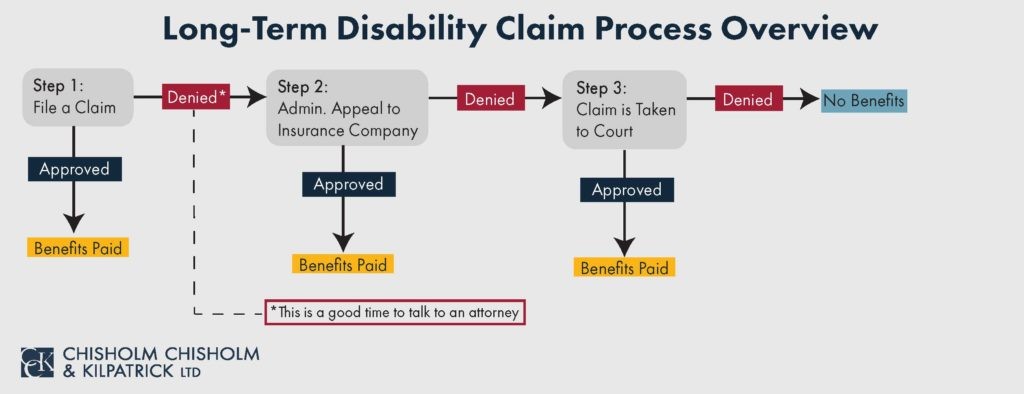Getting Long-Term Disability (LTD) Benefits for Genitourinary Disorders

Coping and learning to live with a genitourinary condition can be stressful and you may be wondering how you will continue to support your family if you become unable to work. Unfortunately, the process for filing a long-term disability (LTD) claim is not always simple and wrongful denials by the insurance company are all too common.
At Chisholm Chisholm & Kilpatrick LTD, our team of attorneys and professionals can help level the playing field and advocate against the insurance company on your behalf. We have experience helping clients access their long-term disability benefits and appeal wrongful denials made by the insurance company.
Let us fight for you. Call us today at 401-331-6300 for a FREE consultation to see if we can assist with your genitourinary long-term disability claim.
Understanding Genitourinary Disorders
The body’s genitourinary system is comprised of the kidneys, ureters, bladder, urethra, and genital organs. Diseases of the genitourinary system can include congenital abnormalities, iatrogenic injuries (injuries caused by other medical treatment), and other disorders such as cancer, trauma, infection, and inflammation, which usually lead to loss of function in the affected area. The severity of these disorders, as well as their symptoms and treatment, can vary; however, below, we will explore some of the more serious conditions that often lead to functional limitations that affect one’s ability to work.
Chronic Kidney Disease
Chronic kidney disease is a progressive deterioration of renal function, which normally occurs over a long period of time. Symptoms of chronic kidney disease usually appear slowly and become more severe in advanced stages. Some of the more serious and life-altering symptoms include, but are not limited to, nausea and vomiting, fatigue, decreased mental acuity, peripheral neuropathy, and seizures.

To diagnose you with chronic kidney disease, your doctor will likely request blood work in order to test your renal function and, in some cases, you may have to undergo a renal biopsy. Once a diagnosis is confirmed, treatment is frequently directed at treating the cause of the kidney disease, such as diabetes or hypertension. Your doctor will likely recommend fluid and electrolyte management, blood pressure control, and anemia treatment. In serious cases, you may require dialysis treatments or need to undergo a kidney transplant.
If you are in advanced-stage kidney disease, the symptoms will likely prevent you from working reliably and consistently. For example, you may not have the stamina to make it to work on time, day after day, and perform continuous work at a full-time job. Additionally, if you experience peripheral neuropathy in your hands or feet, it could interfere with your ability to perform routine tasks such as walking, typing, or writing. Finally, if you have decreased cognitive function, you will likely be unable to concentrate on your tasks, and may have difficulties with memory, comprehension, and learning new skills.
Genitourinary Cancers
There are many types of genitourinary cancers including, but not limited to, bladder cancer, prostate cancer, renal cell carcinoma, and testicular cancer. Bladder cancer patients usually present with symptoms such as blood in the urine, increased urgency and/or frequency of urination, or urinary obstruction that often causes pain. Bladder cancer is typically diagnosed by cystoscopy and biopsy. Treatment can vary depending on the stage of the cancer, however, it usually consists of a combination of surgery, chemotherapy, and external beam radiation.

Symptoms of prostate cancer are usually rare until the tumor has grown to a size where there is blood in the urine or prostate obstruction with pain when urinating. Doctors are usually able to diagnose prostate cancer by administering a rectal examination or a blood test that measures the level of prostate-specific antigen in a man’s blood, and the condition is usually confirmed by a transrectal ultrasound biopsy. The survival rate for patients with prostate cancer is high and treatment can include a prostatectomy, radiation therapy, chemotherapy, or even just active surveillance.
Renal cell carcinoma is the most common form of kidney cancer. Patients who are later diagnosed with renal cell carcinoma often present with symptoms like blood in the urine, flank pain, or a fever of unknown origin, and can typically feel a palpable mass in the abdomen.
Unfortunately, symptoms of renal cell carcinoma are usually absent until the cancer has metastasized. Oftentimes, the cancer is found incidentally when the patient undergoes a CT scan or MRI for a different reason. Once the mass is found, a biopsy is usually required in order to confirm the diagnosis. If the cancer is caught and treated early enough, surgery and targeted therapies are often successful. Chemotherapy, radiation, or palliative therapies may be required to treat advanced and more severe forms of renal cell carcinoma.
Testicular cancer is the most common solid cancer (a cancer that affects a solid organ instead of a liquid like blood) for males between the ages of 15 and 35. This form of cancer typically begins as a scrotal mass, which is usually not painful.
Once the mass is detected, a doctor will likely order an ultrasonography in order to diagnose the condition. Once confirmed, treatment usually consists of orchiectomy, or removal of the testicles, lymph node dissection, radiation therapy, or chemotherapy. Depending on the stage and history of the cancer, a combination of these treatments may be required. Because testicular cancer is usually detected early, the prognosis and survival rate of those who are diagnosed is usually fairly high.
With all the cancers listed above, as is true for most cancers, you may not be able to continue working, especially if you need radiation or chemotherapy treatments. The frequency of these treatments alone could impact your ability to maintain a full-time job. Even if you were able to physically get to work, you would likely experience the symptoms of your cancer including pain or general discomfort, fatigue, and increased frequency of urination, which would negatively impact your ability to perform your job reliably and consistently.
Additionally, these symptoms, as well as your diagnosis, will likely be distracting and could result in an impaired ability to multi-task, focus, and pay attention to detail. Finally, even if your cancer goes into remission, you may continue to experience disabling side effects of your treatment including brain fog and memory impairment, neuropathy, and chronic fatigue.
Nephrotic Syndrome
Nephrotic Syndrome is a condition in which an individual excretes more than 3 grams of protein each day through their urine. The normal range of daily protein excretion is less than 150 milligrams. This condition is more common in children, however, adults can also suffer from nephrotic syndrome, usually as a result of another condition like preeclampsia or diabetes. Symptoms of nephrotic syndrome include anorexia, general malaise and fatigue, and frothy urine, which is the result of the high concentrations of protein. Nephrotic syndrome is also associated with complications including shortness of breath, joint pain, and abdominal pain.

In order to diagnose nephrotic syndrome, a doctor will likely take urine samples at random in order to calculate the level of protein you excrete during the day based on individual samples. Doctors will likely run additional tests to help determine the severity and potential complications of the condition. For example, they will look at your cholesterol and triglyceride levels, as those are typically increased in patients with nephrotic syndrome.
Once diagnosed, there are many treatment options available including, but not limited to, treating the underlying cause of the nephrotic syndrome, a medication that restricts the proteins in the body, restricting the sodium in the body, and using diuretics to help with fluid retention. While the prognosis can vary depending on the cause of the condition, complete remission is possible with treatment. In cases where the individual suffers from other complicating factors such as infection, hypertension, or thromboses, the prognosis can be worse.
If you experience complications of nephrotic syndrome including fatigue, joint or abdominal pain, and shortness of breath, you may be unable to perform your job duties reliably and consistently. Your joint and abdominal pain would likely affect your ability to perform more physical tasks like climbing stairs and ladders or carrying and lifting boxes, but it could also impact your ability to sit at a computer for most of the workday. Additionally, shortness of breath and increased fatigue may impact your ability to work continuously for 8 hours without needing frequent breaks, or even a nap.
How CCK Can Help With Denied Genitourinary Long-Term Disability Claims
At CCK, we understand how your ability to work can be impacted by a new condition such as a genitourinary disorder. We can help you navigate the difficult process of applying for long-term disability benefits and, if the insurance company wrongfully denies your claim, submitting a comprehensive administrative appeal on your behalf.

The attorneys and professionals at CCK work hard to develop the strongest record possible at the appeal level, so that your disability is well supported by the medical evidence. This is particularly important in the ERISA context, as the administrative appeal is usually the last opportunity claimants have to get evidence into the record.
One of the main pieces of evidence we gather during the appeal process is our client’s medical records. It is important to have treating doctors who are willing to support your LTD claim with detailed records and be willing to complete forms and write reports when necessary.
We often talk with our clients about the importance of discussing their disability with their doctors and making sure their doctor is detailing things appropriately and accurately in their medical records. Some of the important things that we look for when reviewing records are physical exam findings, diagnostic imaging test results, medication changes and side effects, and the client’s account of their symptoms and functional limitations.
We also review the insurance company’s claim file, the plan documents and policy, and the denial letter in order to determine if any errors were made during the insurance company’s review of your claim. We use our knowledge of ERISA, the U.S. Department of Labor Regulations, and various insurance policies to identify any mistakes that ultimately led to the denial or termination of your benefits.
The claim file also helps us to identify what evidence is missing from the record, so we can make sure we obtain that evidence during the appeal. For example, if the insurance company argues that there are no objective findings that demonstrate your joint pain, we may be able to send you for a functional capacity assessment in order to get an expert’s opinion and objective test results in support of your disability. In addition to expert opinions, we often get reports from your treating doctors and witness statements from you and your family, friends, or co-workers.
Once we gather all the evidence that supports your disability, we write the appeal. We put together the supportive evidence to tell our client’s story and demonstrate how their disability impacts their ability to work. Call us today at 401-331-6300 for a FREE consultation about your claim.

Share this Post